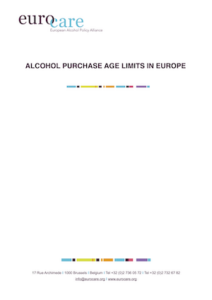View this report

Alcohol is a potent psychoactive drug whose consumption even in small quantities can lead to negative outcomes. With this in mind, the 1995 World Health Organisation (WHO) European Charter on Alcohol declared:
All children and adolescents have the right to grow up in an environment protected from the negative consequences of alcohol consumption and, to the extent possible, from the promotion of alcohol.
Adolescents who drink alcohol are at greater risk of brain damage than adult drinkers, and children who drink alcohol are more likely to develop problems such as dependency in later life.
There is an established body of evidence that alcohol can have particularly destructive effects on physiological and psychological development during childhood. According to a report by Scottish Health Action on Alcohol Problems (SHAAP), there is some evidence that alcohol-associated brain structural effects are more pronounced in adolescents than in young adults because the adolescent brain has a different and largely greater sensitivity to alcohol than the adult brain.
As adolescence is both a critical stage of development of the human brain, exposure to addictive substances like alcohol can have the potential to delay or disrupt cognitive control development or desensitise reward processing, establishing patterns and processes which leave young people predisposed to riskier behaviour or substance misuse.
A Finnish study supports the possibility of a causal link between childhood drinking and adult alcohol misuse. Its long-term follow-up of children until middle age found that for both males and females, early onset of drinking (i.e. at or before the age of 14) was a significant risk factor for heavier drinking, binge drinking and for experiencing symptoms of alcohol dependence in adulthood. The authors concluded that delaying the initiation of drinking from early to late adolescence is therefore an important goal for prevention efforts.
A 2009 report produced by the then Chief Medical Officer of England, Sir Liam Donaldson listed a range of potentially adverse consequences (illustrated below), concluding that that an alcohol-free childhood was “the healthiest and best option” for a child’s development.
View this report
